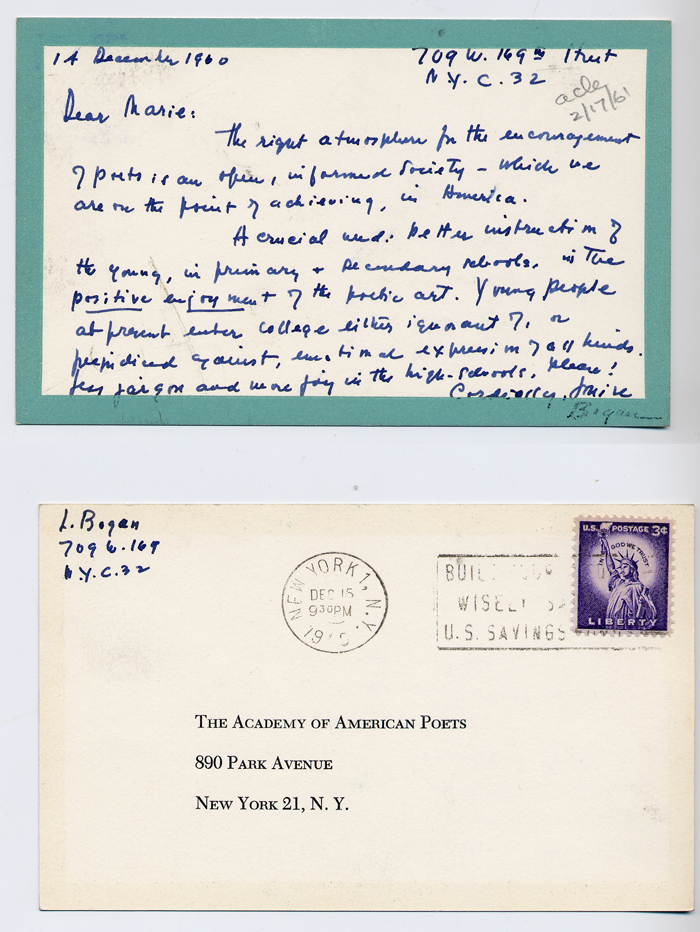
Dear Marie:
The right atmosphere for the encouragement of poets is an open, informed society—which we are on the point of achieving, in America.
A crucial need: better instruction of the young, in primary & secondary schools, is the positive enjoyment of the poetic art. Young people at present enter college either ignorant of, or prejudiced against, emotional expression of all kinds. Less jargon and more joy in the high schools, please!
Cordially,
Louise Bogan
In this 1960 postcard from our archive, Louise Bogan responds to Marie Bullock, founder of the Academy of American Poets, regarding the state of poetry at the time, particularly in the schools.
In keeping with the mission she enacted for the Academy of American Poets when she founded it, Bullock always made sure to keep abreast of trends in the poetry world and find ways to bring poetry to a wider audience. She would frequently ask for feedback from the poets on the Board of Chancellors, something it appears she did with Bogan, who was about to step into her post on the board, a position she would hold from 1961 until 1970.
The points Bogan stresses in her note pertain to an “open, informed society” and “better instruction of the young.” While it’s not certain what specifically Bogan was referring to in her implication of American society, her remark is not surprising, given the amount of changes and social movements that marked the decade: civil rights, gay rights, women’s rights, and the Vietnam War, among them.
Bogan’s emphasis on education and a changing society is particularly notable due to her own background; Bogan received an exemplary classical education at the Girls’ Latin School in Boston, taking subjects such as Latin, Greek, and French, and regularly writing poems. However, she also faced stifling prejudice against her Irish roots; the school headmaster of the time even warned Bogan not to expect to become editor of the literary magazine because, he said, “no Irish girl could be editor of the magazine.” Bogan went on to Boston University for a year and won a scholarship to Radcliffe for the fall of 1916, but decided to marry instead. As a result, Bogan would later be sensitive, and at times somewhat insecure, about the fact that she did not complete her higher education. In a 1955 letter to a young poet, she wrote, “I married at nineteen, after one year of college, and I have been forced to educate myself, the hard way, ever since.”
Still, Bogan made history by becoming the first woman to hold the position of consultant in poetry in the English language (which later became the U.S. poet laureateship).
Just a few years before she had written this note, Bogan had—along with Léonie Adams—been awarded the Bollingen Prize in Poetry, and in 1959, she was awarded the Academy of American Poets Fellowship. Bogan, who wrote the majority of her work in the earlier half of her life, would publish just one more book after the date of this letter: The Blue Estuaries: Poems 1923–1968 (Farrar, Straus & Giroux, 1968). She died two years later, on February 4, 1970.
